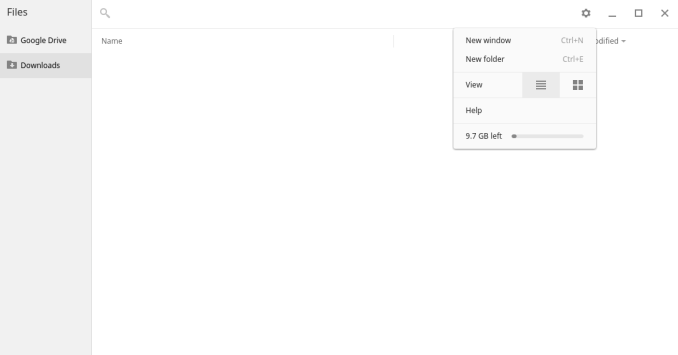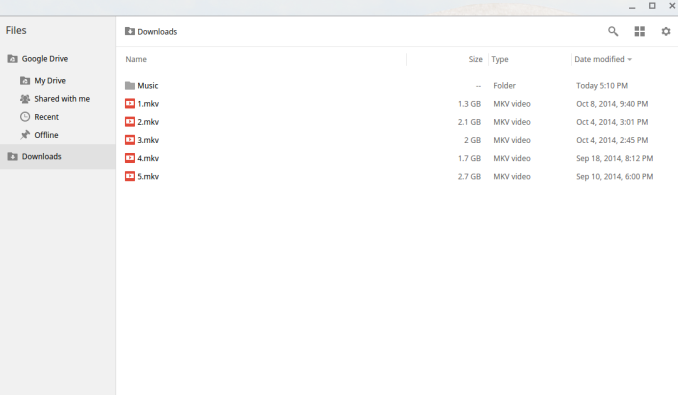Upgrading the SSD in Chromebook & MyDigitalSSD Super Boot Drive M.2 2242 SSD Review
by Kristian Vättö on October 21, 2014 8:00 AM ESTManaging Storage in Chrome OS
Chrome OS behaves a lot like iOS and Android when it comes to file management. While other computer-level operating systems like Windows and OS X give the user full access to system files, Chrome OS only provides very basic file management options.
The user access is limited to 'Google Drive' and 'Downloads' folders, and out of these two Downloads is the only truly local folder since Google Drive relies on cloud storage (although it does have offline functionality too). There is no way to create additional folders (or at least I could not find a way), so if you want to store something locally, it must be stored in the Downloads folder.
The 16GB SSD has about 9.7GB left with the operating system installed, so there is certainly not much room for offline storage in the default configuration. With the 256GB SSD installed, the free space increases to about 204GB, although I am not sure where the remaining ~46GB has gone.
Fortunately, it is possible to create folders inside the Downloads folder, so you can at least have some level of organization for local files. Chrome OS has integrated audio and video playback software (even MKV files are supported!) that can be used to play back local files, but especially the audio player is very limited and does not have support for playlists or other more sophisticated features. It works, but the user experience is much better if you have an Internet connection and use Google's web-based Play Music.
Anyway, there is not much to say about Chrome OS' file management. It is very limited and not user friendly for someone who is used to using Windows or OS X, but if you can work around the limitations it can be usable even with a larger internal drive. As far as performance testing under Chrome OS, there isn't much to be done; the MyDigitalSSD Super Boot Drive feels a bit faster on some tasks, but Chrome OS doesn't tend to hit storage much so the performance benefits aren't the primary reason to upgrade. But let's look at performance with the original and upgrade SSDs using our standard storage tests.












67 Comments
View All Comments
sligett - Wednesday, October 22, 2014 - link
But one might instead say --I have zero clue why Windows laptops are so popular. I tried one and it was laughably complex compared to Chromebooks that are now pretty much priced the same. This might be ok, but for its complexity, Windows doesn't really run any faster than its Chrome OS counterparts, nor does it get much better battery life at all. I just see no reason unless you just absolutely detest ChromeOS.
BrokenCrayons - Tuesday, October 28, 2014 - link
I think one of the root causes for Chrome OS drawing ire is Google's invasive data mining activities associated with the device, storage of information on their servers, and the linking of that data with web browsing habits (including sites that use Google Ad Services -- of which there are many), GPS and cellular triangulation information (if you also happen to be using Android), mail, app use, time spent in each app, and so forth. Google being behind Chrome is one of the biggest problems with uptake of the platform. Since most of Google's services are offered free of charge, you can be assured that they're generating profit by "farming" their users in the same way social networking does, by monitoring and analysing everything at all times on as many platforms as possible.patel21 - Wednesday, October 22, 2014 - link
If we can create a recovery media, then can we install it on normal PC's ?Bob Todd - Wednesday, October 22, 2014 - link
If you just want to play around and test it, you can just grab a Chromium OS build from various places.daddacool - Wednesday, October 22, 2014 - link
"While the whole netbook boom kind of died with the introduction of tablets"I remember the actual reason for the demise of netbooks being feature creep, obviously coupled with the associated price creep. Netbooks we're orginally known as SCCs; Small Cheap Computers. Once the price began edging up into budget laptop price, the case for them became much less compelling.
waldojim42 - Thursday, October 23, 2014 - link
Yep, I thought this too. I remember netbooks reaching into the $400~$500 range while still running crap Atom processors. I don't know who they expected would be in the market for them, but it sure wasn't me.a1exh - Wednesday, October 22, 2014 - link
How well does the "chrome://imageburner" upgrade method work? If your internal 16/32GB drive is almost full (of non-compressible data) presumably you need a 16/32GB SDHC or USB stick?extide - Friday, October 24, 2014 - link
It doesnt back up your daownloaded data, just the OS.abianand - Thursday, October 23, 2014 - link
Does this SSD upgrade keep the cost of this Chromebook at $200 or increase it?Suo.Eno - Thursday, October 23, 2014 - link
Here you go brohttp://www.anandtech.com/show/8543/upgrading-the-s...